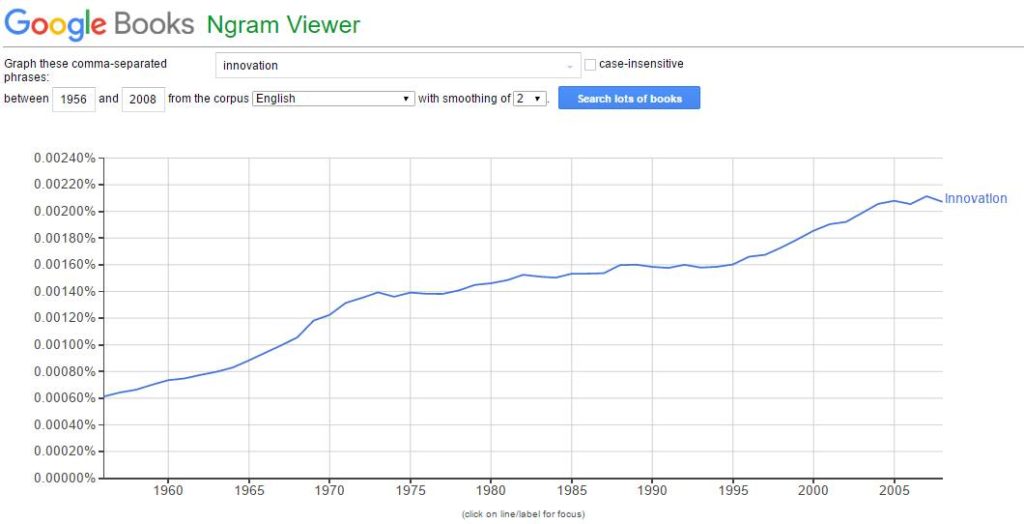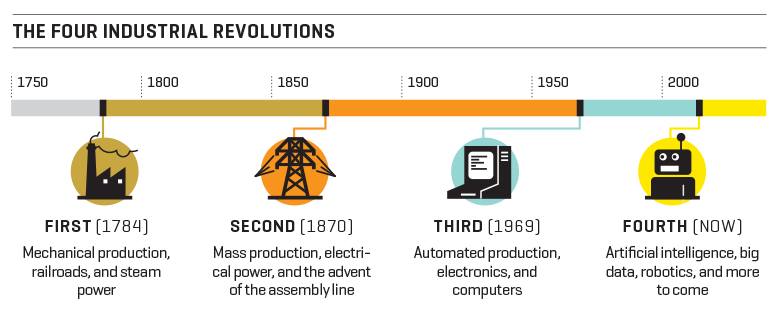- How Smart Companies Are Winning With Theory Y Workers
If there is anything the 21st century has taught us about the competitiveness within industries, it is that size is no more a significant advantage – like it was in the good old days when the big boys blew the smaller guys out of the water. Casting an eye on some of the major industrial disruptions in the past decade, these upsets were caused by smaller, and before then non-entity, organizations. Airbnb disrupting the hospitality industry, Uber in the transportation space, social media platforms becoming the go-to for corporate communication and public relations. The list is a long and very familiar one. As Klaus Schwab puts it, “In the new world, it is not the big fish which eats the small fish, it’s the fast fish which eats the slow fish.”

The use of the word “Innovation” has seen a massive spike since 1956. Source: Google
Innovation is now at the heart of organizations. A quick look at Google’s Ngram Viewer for the usage of the word “innovation”, as at 1956 – towards the end of the second industrial revolution – the word appeared, in materials available to Google, 0.00061%. By 2008, Google’s last available maximum data range, the word had climb to 0.00211%. The frequency of the usage of the word nicely correlates with its upward trajectory in today’s organizations. Innovation is now driving organizations to go better, faster and smarter. It has been integrated in pretty much most functionalities. From how people are scouted and recruited: think Application Tracking System, professional network websites. To how they do their work: blurring the line between leisure and work in the workspace, home-office flexibility. The tools they use: Customer Relationship Management (CRM) with embedded Artificial Intelligence (AI), productivity tools. You can subtly see innovation written all over. And at the heart of these innovations are… people! Now that is the crux of this gist.

A timeline of the Industrial Revolution. Image credit: Fortune.com
Innovation drives organization but seated in the driver sit of innovation are smart people. People who anticipate the future, change, increase in efficiency thereby productivity. These people rise above the challenges faced and in doing so, provide the solutions that help organizations become the fast fish that eats the slow fish – irrespective of its size. Tying it all together is Douglas McGregor’s theory of people and management style. According to McGregor, there are two types of workplace behavior. The Theory X people are naturally lazy and need increased supervision and hands-on management. Theory Y, on the other hand, are proactive and get things done. They anticipate challenges and take initiative. They do not need to be reminded to do their job, they take pride in doing their job. And right there are the people taking the driver’s seat of innovation.
With workplace being more relaxed and employees given a truck load of trust, the theory Y worker is the one that understands, despite spending 20 minutes in the recreation room playing a game of table soccer, time has been expertly managed so that the tasks of the day gets completed before close of business. The theory Y worker knows, even though they can work from home, their productivity should not be affected by any means. The theory Y worker is smart enough to spend the company’s resources like it’s theirs. Enjoying the perks but being absolutely responsible. Above all, the theory Y worker does not have to wait for their manager to identify where productivity can be increased through. They think three steps ahead of the game and propose these solutions for the growth of the team and company at large.
The result? Organizations end up with an agile workforce that is on a continuous quest to outdo itself. And that puts them on the forefront in the highway of innovation. More responsive, forward-looking, anticipatory and profitable. These organizations also have one thing in common, they attract the next generations of theory Y workers – those still in college – putting themselves in a position to continuously keep innovating and being the fast fish.